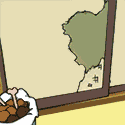|
SniHjen posted:Denmark, Taiwan, and Sri Lanka are all gone. Sri Lanka had been eaten by India before she was deflated like a burst balloon. Also don't look at what happened to the Glorious Nippon. (At least the Russo-Japanese tensions are over now that the disputed islands have been erased from existence) Hainan is gone too, so they aren't discriminating against Taiwan.
|
|
|
|

|
| # ? May 22, 2024 15:21 |
|
And Japan is all one island.
|
|
|
|
I think purple is actually "areas that are important according to the map maker"
|
|
|
|
The map maker got Russia's arctic coast pretty accurate though.
|
|
|
|
Long Island is missing, too, and the Philippines have somehow merged with Borneo.
|
|
|
|
Peanut President posted:Areas with Mediterranean climate are full of assholes. Rumda posted:Racist Idk, between Silicon Valley/San Francisco and Cape Town I think he may be on to something here!!!
|
|
|
|
Farecoal posted:Idk, between Silicon Valley/San Francisco and Cape Town I think he may be on to something here!!! Is the Bay Area notably racist now?
|
|
|
|
Dusseldorf posted:Is the Bay Area notably racist now? I meant the "full of assholes" part.
|
|
|
|
Dusseldorf posted:Is the Bay Area notably racist now? That depends on your views on segregation.
|
|
|
|
I just realized Baidu is kind of a joke on googol
|
|
|
|
steinrokkan posted:This map was made by somebody who hates islands, and REALLY can't stand archipelagos. I like to think that Sweden is extending its hand to its good finnish buddy.
|
|
|
|
Disco Infiva posted:I support this sentiment. Let's all chill on some nice Mediterranean beach The map has Mallorca but neither Sardinia nor Corsica The map has the Juan Fernandez Archipelago. Is this some insane future map where the whole of Greenland has melted or something?
|
|
|
|
Mister Adequate posted:The map has Mallorca but neither Sardinia nor Corsica If you're waiting for Greenland to melt I have bad news for you.
|
|
|
|
Dusseldorf posted:If you're waiting for Greenland to melt I have bad news for you. Oh I know it's not a solid block of ice or anything, I was just hypothesizing about what could possibly have sparked such a bizarre map.
|
|
|
|
Mister Adequate posted:Oh I know it's not a solid block of ice or anything, I was just hypothesizing about what could possibly have sparked such a bizarre map. All this kvetching over that map is silly. The purpose of the map was to show one climate region, and it did that. I doubt that any of you saw it and said, "Wait, without Greenland, or the Kurils, I can't make out where things are in this representation of the world." Maps are made to relay information, and often times the incredible complexity of the coastlines of the Earth, and even the presence of certain major (often ice-covered) land masses are not that purpose. When you're this orthodox about cartography, every map is going to be politically-loaded.
|
|
|
|
TildeATH posted:All this kvetching over that map is silly. The purpose of the map was to show one climate region, and it did that. I doubt that any of you saw it and said, "Wait, without Greenland, or the Kurils, I can't make out where things are in this representation of the world." Maps are made to relay information, and often times the incredible complexity of the coastlines of the Earth, and even the presence of certain major (often ice-covered) land masses are not that purpose. Seriously, this was a map about a very limited biome, no poo poo they're not going to have the Azores in full resplendent detail. E: Haha I'm an idiot, the one obscure island chain I mention actually has a Mediterranean climate.
|
|
|
|
TildeATH posted:All this kvetching over that map is silly. The purpose of the map was to show one climate region, and it did that. I doubt that any of you saw it and said, "Wait, without Greenland, or the Kurils, I can't make out where things are in this representation of the world." Maps are made to relay information, and often times the incredible complexity of the coastlines of the Earth, and even the presence of certain major (often ice-covered) land masses are not that purpose.
|
|
|
|
Fine, fine! Here!!  
|
|
|
|
menino posted:Seriously, this was a map about a very limited biome, no poo poo they're not going to have the Azores in full resplendent detail. It wasn't wasn't worth criticizing because of few missing islands, it was just funny because the entire map was warped on a fundamental level and every island twisted, tortured and spat back. Geography humor.
|
|
|
|
DrSunshine posted:Fine, fine! Here!!
|
|
|
|
DrSunshine posted:Fine, fine! Here!! WHERE ARE THE AZORES
|
|
|
|
DrSunshine posted:Fine, fine! Here!! It's missing a little island called ANTARCTICA.
|
|
|
|
I think it's kind of interesting! It's a fairly specific biome type, so it's interesting to see where it shows up besides the actual Med. Also interesting, though not unexpected, that it occurs in specific bands away from the equator.
|
|
|
|
DrSunshine posted:Fine, fine! Here!!
|
|
|
|
A Buttery Pastry posted:Where is Novaya Zemlya? Svalbard? All the other Arctic islands? This map is pure rubbish. Not Mediterranean therefore doesn't matter.
|
|
|
|
menino posted:WHERE ARE THE AZORES The Azores, particularly São Miguel, is as close as the world comes to perfection. I'm sailing there next year.
|
|
|
|
TildeATH posted:It's missing a little island called ANTARCTICA.  Antarctica is the lonely continent. Last-discovered, least populated. Antarctica has no indigenous population or any signs of habitation before the 19th century, and even today has no permanent population, only a transient population of researchers that varies from about 1,000 in the winter, to 4,000 in the summer.  Research in Antarctica covers everything from climate change, to geology, to astronomy (the permanent night of winter and lack of any light pollution makes it great for observatories). People theorized the existence of Antarctica long before it was confirmed. The sheer amount of landmass in the Northern Hemisphere led many to believe that there must be an equal amount of corresponding landmass in the Southern Hemisphere, to balance it out. This idea dates back all the way to Aristotle, in the 4th century BC, and was popular later among the Romans, who named it Terra Australis ("Southern Land") or sometimes Terra Australis Incognita ("Unknown Southern Land"). Because the Southern Hemisphere was so poorly explored, it could be anywhere down there; before the Cape of Good Hope was circumnavigated, it was even thought that Africa might connect to Terra Australis in the south. As the Age of Exploration got underway, many of these ideas were discarded, but the concept of a Terra Australis remained:  (Abraham Ortelius world map, 1570)  (Johannes Schöner globe, 1533) Note a couple consistent features, like South America being almost or completely connected to Terra Australis. When Magellan circumnavigated the world, he passed through the straits that were named after him; Tierra del Fuego to his south was believed to be the most northern extension of the Southern Continent (the discovery of Cape Horn in 1615 disproved this). A number of explorers tried to head further south to find the continent, including James Cook, who managed to reach as far as 71 degrees south before being blocked by ice. Who exactly sighted Antarctic land first is up for debate (and I would just encourage you to read the Wikipedia article on that), but it occurred sometime in 1820, with the first landing occurring sometime in 1821. It was not until 1890 that John George Bartholomew applied the name "Antarctica" to the new continent (Australia having already officially gotten the "Terra Australis" name). This map from 1898 (from a plea for further exploration of Antarctica) shows the knowledge of the continent at the time:  Explorations of the new continent continued over the course of the 19th and early 20th centuries, and the party of Roald Amundsen became the first to reach the South Pole on December 14, 1911. He was shortly followed by Robert Scott's famously doomed party, who reached the pole only to die on the return journey. Antarctica is the fifth-largest continent, surpassing only Europe and Australia in size. Most map projections distort the poles tremendously, so it is difficult to tell the true size of Antarctica from a standard map. For comparison, here is Antarctica and the US:  And Antarctica and Europe:  The actual Antarctic land is much less, since a lot of that area is ice shelf. Here's the bedrock of Antarctica by elevation:  Interestingly, if all the ice were to melt, it wouldn't look like that. Ice weighs a lot, and it's actually pushing down the elevation of the continent. Assuming Antarctica were to melt, or had never been frozen, the elevation would look something like this (this also takes into account the rise in the ocean level):  And here's a heightmap of the surface (land and ice shelf) for comparison:  But this is a thread about politics, so let's talk about that. A number of countries have laid claims on Antarctic territory, not all of which are universally recognized:  Even the Nazis got in on that action, with New Swabia:  The US and Russia, though not having any existing claims, basically say that they have the right to do whatever they want at any future point. In an effort to sort out the international status, the Antarctic Treaty was signed in 1959:  (Every country in color is a party to the treaty. All of those except yellow get a say in management of Antarctica. Brown has existing claims, red reserves the right to future claims.) The gist of the Antarctic Treaty is that Antarctica is a politically neutral zone. The treaty does not recognize or ignore existing claims, but basically locks them into place; no new claims can be made, nor can existing claims be changed. It also prohibits any military presence on the continent, encourages international scientific cooperation, and establishes a number of internationally protected nature reserves on the continent. Other subsequent treaties prevent any exploitation of mineral resources on the continent except for scientific purposes. Which brings us to environmentalism. Antarctica famously became associated with an environmental crisis when it was discovered that CFCs were depleting the ozone layer. By trapping ozone-depleting chemicals, the polar winds make the poles the site of the greatest destruction of the ozone. Here's the status of the ozone layer in 2013:  The good news is that that's doing a lot better than it has been, due to regulations on production and use of CFCs, and barring any other environmental effects, it is predicted to make a recovery by the mid 21st century. Oh wait, did I say barring any other environmental effects? Because guess what else is threatening Antarctica!  See that? That's temperature increase over the last half century (red is about a quarter degree Celsius). West Antarctica, the red area, is one of the fastest warming regions on Earth, and it's already taking its toll on the Antarctic geography:  That's the Larsen ice shelf, which has been collapsing by parts for the last couple decades. It's not the only one; hundreds of square miles of ice shelf, across the Antarctic Peninsula, have been collapsing due to warming trends. And there's another potential threat. See, mineral exploitation may be banned, but even if it were allowed, Antarctica is just a hard place to work in. Look at all that ice, for starters. But if warming trends continue and all those minerals become easier to access, are countries still going to be as sanguine about not drilling and mining? Who knows? So on that depressing note: that's Antarctica. Enjoy it while it lasts. 
Lord Hydronium fucked around with this message at 18:29 on Apr 23, 2014 |
|
|
|
I love that its name is basically Anti-Arctic. Nice post btw.
|
|
|
|
Disco Infiva posted:I love that its name is basically Anti-Arctic. That's the origin of the term - opposite to the arctic. Arctic, coming from the Greek word for bear since Ursa Major/Ursa Minor are in the north.
|
|
|
|
Thanks for the good Antarctica post.
|
|
|
|
I would feel remiss not to mention the sea level around Antarctica would actually be lower without the ice, as the sheer mass of it pulls the water up around it, and not a negligible amount either. The same goes for Greenland, though to a much smaller degree. (100m around the edge compared to 500m for Antarctica.) On the other hand, not many people live near the bulge around Antarctica, while the one around Greenland continues down to the northern shores of continental Europe. (Which also means these areas are less vulnerable to Greenland melting, and actually gain from it north of England.)
|
|
|
|
esquilax posted:Arctic, coming from the Greek word for bear since Ursa Major/Ursa Minor are in the north. When I was a kid, I thought that Ursa Minor was only visible from the southern hemisphere. Which is doubly hilarious because Ursa Minor contains Polaris, or you know a star commonly known as The Northern Star. 
|
|
|
|
Lord Hydronium posted:Antarctica effortpost: I hope that one day in my lifetime I can see Antarctica with my own eyes. The idea of this vast, snowy nothing just gives me chills inside, like when I stare at the Hubble Deep Field for too long. A coworker of mine is going on vacation to participate in a marathon on Antarctica and it almost makes me want to take up running so I can do that in the future.
|
|
|
|
Lord Hydronium posted:Antarctica effortpost: This is one of the best posts in Internet history.
|
|
|
|
Great post on Antartica, thanks a lot. I've become interested in the continent lately, and am considering picking up a book on it. Any suggestions?
|
|
|
|
Lord Hydronium posted:
I assume that West-Antarctica is defined as the part west of the prime meridian? Otherwise, I could define the entire coast as North-Antarctica.  LeftistMuslimObama posted:The idea of this vast, snowy nothing just gives me chills inside, like when I stare at the Hubble Deep Field for too long. When you're actually there, you'll probably feel chills outside.
|
|
|
|
Lord Hydronium posted:Antarctica is the fifth-largest continent, surpassing only Europe and Australia in size. Most map projections distort the poles tremendously, so it is difficult to tell the true size of Antarctica from a standard map. For comparison, here is Antarctica and the US: It still blows my mind that Shackleton thought he should try and walk across this. Of course, knowing how the expedition actually turned out, I suppose he had a decent chance of pulling it off.
|
|
|
|
Carbon dioxide posted:I assume that West-Antarctica is defined as the part west of the prime meridian?
|
|
|
|
DrSunshine posted:Fine, fine! Here!!
|
|
|
|

|
| # ? May 22, 2024 15:21 |
|
cheerfullydrab posted:This is a silly question, but why isn't there any of this climate in China? Monsoon?
|
|
|








































 Yes, it's like a lava lamp.
Yes, it's like a lava lamp.
